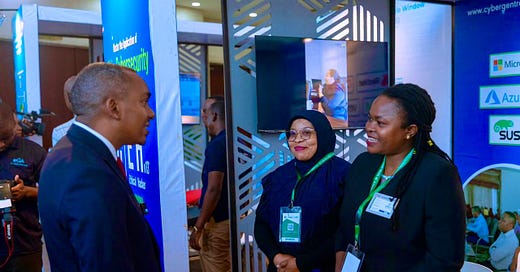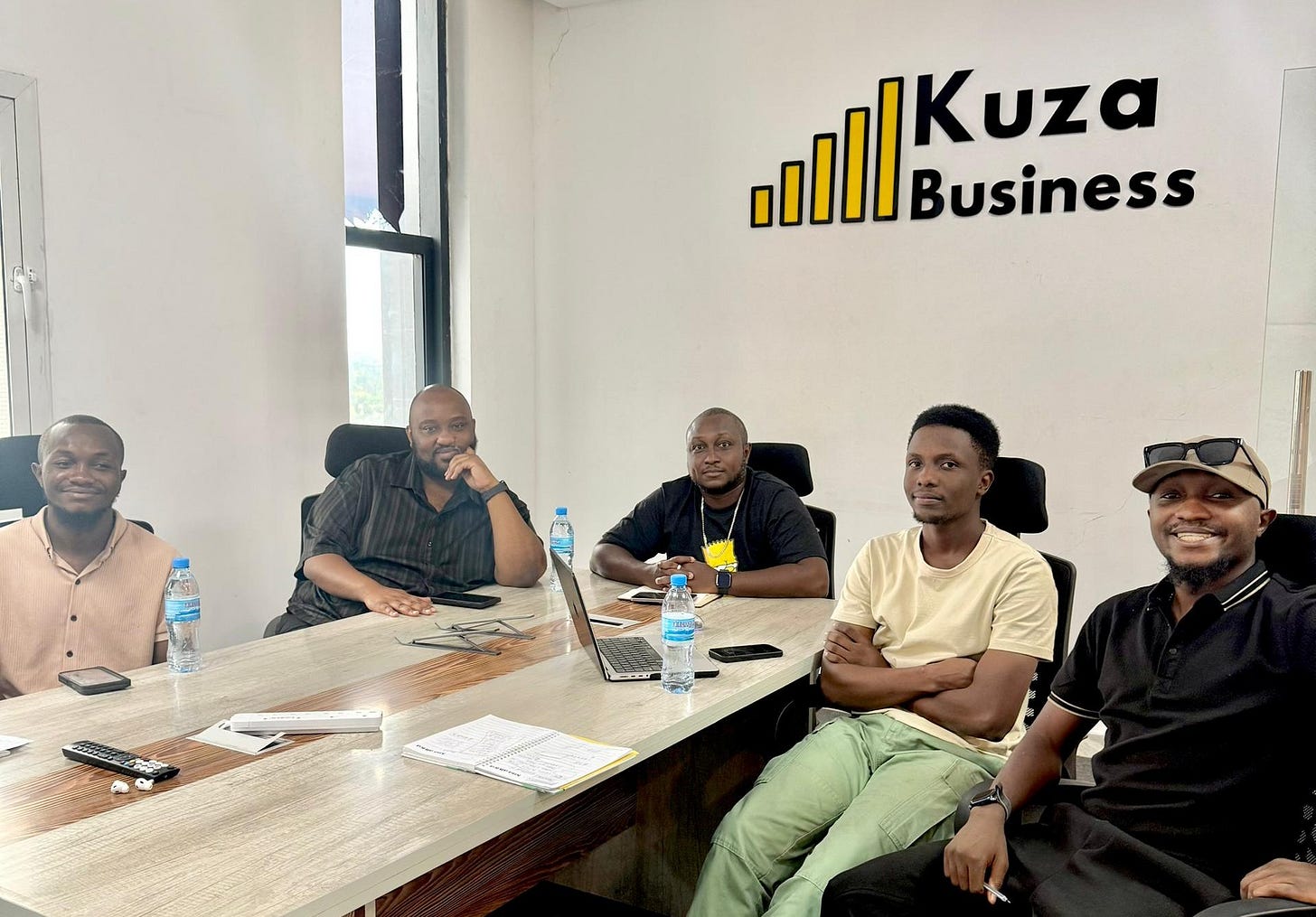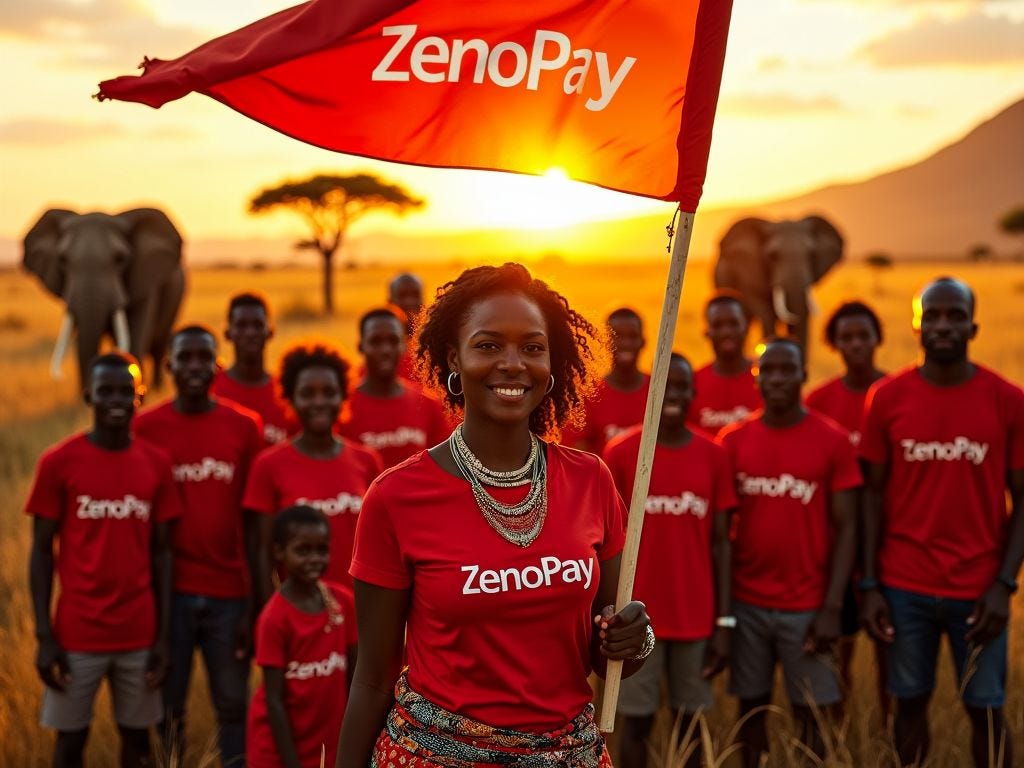This Week in Tanzanian Tech [May 11-17, 2025]
€100K for Swahilies, 800+ businesses on ZenoPay, and Trump's $200B tech diplomacy
Here’s what caught our eye lately.
We spotlight:
Swahilies making international payments easier for small businesses
Conversations at Innovation Week Tanzania 2025
ZenoPay reaching 800 B2B customers
Plus seven more stories worth your time.
Before we dive in.
Every innovation needs skilled professionals to implement it.
Cybergen delivers practical IT training, cybersecurity consulting, and custom software development nationwide.
Call +255 753 666 601.
1. Swahilies Wins €100,000 Grant, Rolls Out B2B Cross-border Payments
Here’s what happened.
The Dar es Salaam-based fintech helps small and medium-sized businesses to digitally manage inventory, record transactions, and access financial services.
On March 28, it announced a TZS 302 million grant funding from Germany’s economic cooperation ministry (BMZ) through the German Investment and Development Company (DEG).
Originally launched in 2021 as an e-commerce installment platform, Swahilies pivoted in late 2022 to focus on helping SMEs digitize their operations, build credit scores and access financial services.
Breaking it down.
The non-dilutive funding comes through the develoPPP Ventures program, which selected Swahilies among 14 East African startups in its seventh cohort.
The company runs two interconnected products: Kuza Business, which handles digital bookkeeping and inventory management, and Swahilies Pay, which processes payments.
It has now combined both products to form one ecosystem for SME management and financial services access.
Their merchant base has grown to over 10,000 SMEs.
“Swahilies has been helping 10K+ SMEs manage inventory and build credit scores for credit access,” wrote co-founder and CEO John Haule in a March 23 post.
“Weeks ago customers asked if we could help them pay international suppliers (due to dollar scarcity) and boom - small pilot transactions happened!”
Worth noting.
In December 2024, Swahilies partnered with SPENN to strategically expand its services to Zambia, marking its first move beyond Tanzania’s borders.
Next steps.
Following recent test payments to non-Tanzanian suppliers, Swahilies aims to develop this capability further in response to customer demand around foreign currency limitations.
“We are not pivoting or launching a new product,” Haule told Atoms & Bits.
“We are simply expanding our offerings in response to what our existing customers have asked for, while also exploring ways to onboard more customers with similar pain points.”
He added, “SMEs are already making cross-border payments, but the process is often unreliable and expensive. We are working to improve all of that and we will be going live soon.”
2. FRS Connects 1,500+ Tech Leaders and Policymakers
Setting the stage.
What happens when you bring together tech entrepreneurs, government ministers, and global experts for five days in Dar es Salaam?
The Future Ready Summit 2025, anchored by Vodacom Tanzania and held at the Julius Nyerere International Convention Centre (,JNICC) from May 12-16, created exactly this mix.
The event formed the centerpiece of Innovation Week Tanzania (IWTz) 2025, co-hosted by UNDP Tanzania through its FUNGUO Innovation Programme and the Tanzania Commission for Science and Technology (COSTECH).
Behind the conversations.
Each day focused on specific challenges facing Tanzania's digital transformation. Day one explored how media can better support innovation, with Rosalynn Mworia of Mwananchi Communications calling for media houses to “stop competing for attention and start collaborating for impact.”
Day two digged into inclusive technology and smart governance, with experts from Finland sharing how 4.4 million Finns (out of 5.6 million) now use digital public services.
Day three featured former Google X Chief Business Officer Mo Gawdat discussing AI’s potential to transform society, while day four included a ministerial roundtable where Prof.
Planning and investment minister Kitila Mkumbo announced plans for a “youth-driven startup policy to build a Future-Ready Tanzania.”
Eye-opening moment.
The summit highlighted Tanzania’s growing focus on youth development through technology.
The Code Like A Girl program, which has impacted over 3,000 young women since 2018, graduated 36 participants during the event.
The winning team created a solution called HACF (HIV-AIDS Counselling Follow-up Organization), demonstrating how technical skills are being applied to local challenges.
Next phase of engagement.
Beyond presentations, the summit included practical skills development through career speed networking sessions, a “Bug Bounty” program where ethical hackers tested Vodacom’s systems, and the Vodacom Digital Accelerator which selected 10 startups for its three-month program.
Companies including Smart Ocean Monitoring, TanzMED, and AgriMfumo will receive support to scale their innovations, showing how Tanzania’s tech ecosystem continues developing beyond mobile money into diverse sectors including healthcare, agriculture, and environmental surveillance.
3. ZenoPay Now Serves 800+ Businesses
Context matters.
Businesses throughout East Africa struggle with fragmented payment systems.
A clothing store owner might check M-Pesa for some transactions, Mixx by Yas for others, and bank transfers separately - wasting hours on reconciliation every week.
ZenoPay eliminates this inefficiency with a unified payment platform that now serves over 800 businesses across Tanzania, Kenya, Uganda, and Nigeria, processing more than TZS 10 million in weekly transactions.
How it works.
ZenoPay Pro gives businesses everything they need to accept and manage payments in one place.
Their API-based system lets companies integrate payment processing directly into websites and apps, while the dashboard provides real-time transaction monitoring.
You can track every payment - whether from mobile money, cards, or bank transfers - through a single interface instead of juggling multiple systems and accounts.
Fact.
Through partnership with Flutterwave, ZenoPay enables Tanzanian businesses to accept payments from customers across Africa, USA, Europe, and the UK.
This opens international markets without requiring merchants to navigate complex foreign payment systems.
Even small businesses without technical teams can easily integrate payments using ZenoPay’s WordPress plugins and ready-made development tools.
Coming up next.
Zeno Limited runs three connected pieces that work together.
First, the regular ZenoPay app (with the red logo) helps customers pay for electricity, TV subscriptions, and airtime without typing USSD codes.
Second, ZenoPay Pro (with the green logo) helps businesses create invoices and track payments in real-time.
Third, the payment infrastructure works invisibly in the background, connecting all these transactions.
The consumer app will soon add water bill payments, internet bundles, and government services.
For enterprises, the system will support bulk airtime purchases (helpful for companies with multiple employees) and scheduled recurring payments.
All these updates appear directly on their app roadmap, showing how Zeno continues building tools that solve real payment problems for both businesses and their customers.
ADDITIONAL HEADLINES
Medikea Expands Services to Dodoma
The healthtech startup has announced its branch expansion to the capital city.
It is actively hiring five medical professionals including a doctor, dentist, and radiographer for its new clinic.
Medikea recently secured $200,000 in pre-seed funding from Madica’s investment program.
MedPack Reports 86% Revenue Growth in Q1.
The Tanzanian healthcare logistics startup released its Q1 2025 report on May 14, showing $105,202 in sales revenue—86% higher than 2024’s quarterly average.
MedPack delivered 1,324 orders between January and April while opening a new fulfillment center.
The company aims to raise $200,000-$500,000 in pre-seed funding by July.
Forestry Fund Applications Now Open
FUNGUO’s €2 million Green Catalyst initiative began accepting applications on May 15.
It’s targeting entrepreneurs across Tanzania’s forestry value chain.
The Finland-UNDP backed program prioritizes women and youth-led ventures developing sustainable solutions.
iPF Softwares Launches Internal Demo Day for Cross-Team Learning
The Dar es Salaam-based software firm has introduced bi-weekly showcases on May 17.
This allows its 35 technology specialists to share project advancements and implementation challenges.
Modeled after major tech conferences (Apple WWDC and Google I/O), the initiative aims to improve knowledge transfer across teams building solutions in 15 African countries.
The company has completed over 180 digital projects since 2015 for clients including UNDP and World Bank.
Chaja Africa Reaches 40% in E-Motorcycle Investment Program
The green mobility startup secured 40 of 100 available slots as of May 15.
Each slot is priced at TZS 4 million.
Investors purchase and legally own the electric motorcycles, while Chaja handles operations with vetted Bolt riders. Thus providing insurance and tracking technology.
The program promises 30% returns over 18 months while accelerating Tanzania’s transition to electric mobility.
US-UAE Sign $200 Billion in Commercial Deals.
The White House announced on May 15 that President Trump secured major investments including Boeing aircraft, aluminum production, and tech partnerships with Qualcomm and AWS.
Tanzania’s foreign missions could adopt similar sector-specific investment targets.
Ambassadors should be evaluated on commercial outcomes alongside traditional diplomatic metrics.
Zanzibar President Honors Yas for Housing Payment System
President Mwinyi has recognized the telco and fintech company for developing the ZHC Connect App to digitize payments for the Zanzibar Housing Corporation.
Mixx by Yas Tanzania CEO Angelica Pesha accepted the appreciation certificate on May 16.
Their platform integrates bill payments, ATM withdrawals and MasterCard functionality, while supporting the newly launched Mwinyi Housing Scheme







